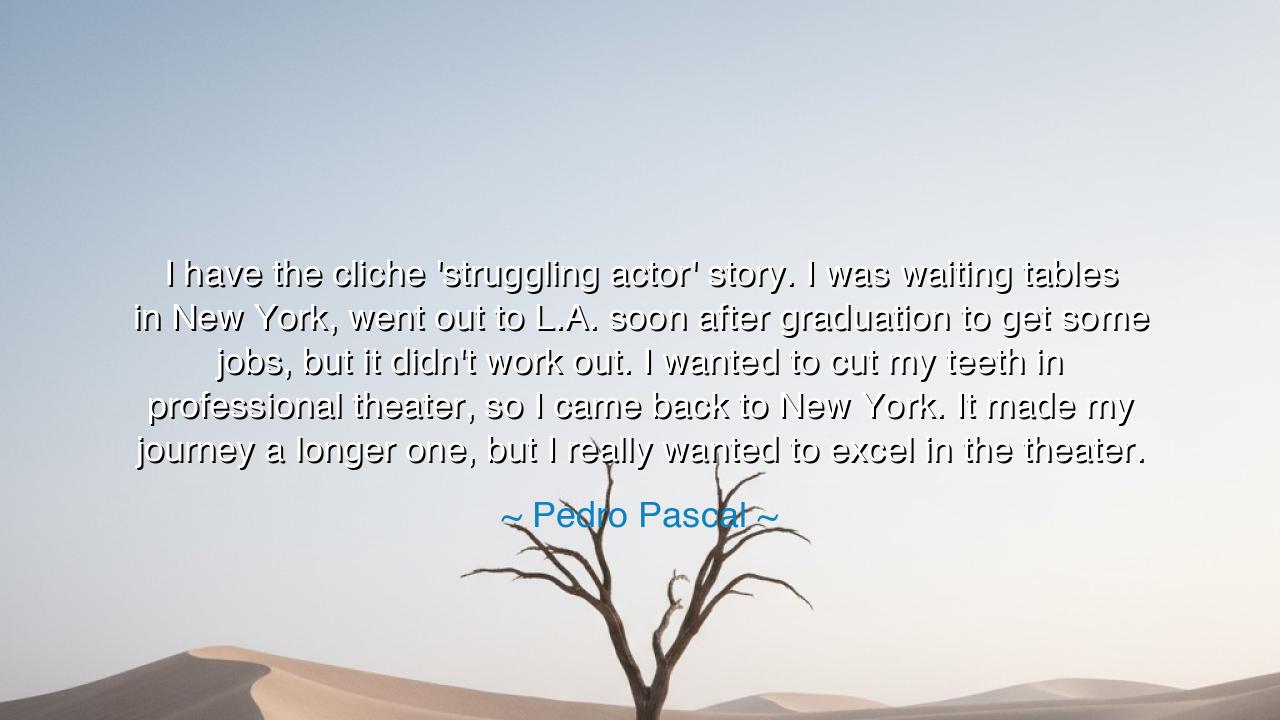
I have the cliche 'struggling actor' story. I was waiting tables
I have the cliche 'struggling actor' story. I was waiting tables in New York, went out to L.A. soon after graduation to get some jobs, but it didn't work out. I wanted to cut my teeth in professional theater, so I came back to New York. It made my journey a longer one, but I really wanted to excel in the theater.






In the reflective and earnest words, “I have the cliché ‘struggling actor’ story. I was waiting tables in New York, went out to L.A. soon after graduation to get some jobs, but it didn’t work out. I wanted to cut my teeth in professional theater, so I came back to New York. It made my journey a longer one, but I really wanted to excel in the theater,” Pedro Pascal unveils a truth as timeless as art itself — that the road to mastery is rarely straight, and that struggle is the crucible in which greatness is forged. Beneath his humility lies the quiet heroism of perseverance: the strength to walk the longer road, to embrace the uncertain, and to choose passion over ease. His words echo with the ancient wisdom that no dream worth living comes without the discipline of endurance and the courage to begin again.
The origin of this quote is deeply personal, born from Pascal’s own pilgrimage as an artist. Long before he became a global icon, he was another dreamer in the crowded heart of New York City, waiting tables to survive, rehearsing lines in the dim light of rented apartments, chasing the elusive call of destiny. Like so many before him, he sought success in Los Angeles, the glittering city of illusion, where countless ambitions rise and fall with the tides of fortune. But the gates did not open. Failure greeted him, not as an enemy, but as a teacher. It was in returning to New York — to the purity of the theater, where the work itself is the reward — that he found his truth. His journey, though delayed, became one of refinement rather than regret.
In his story, we see the universal arc of the artist’s struggle, a story older than any stage or screen. The ancients knew this path well. Aeschylus, the father of Greek tragedy, wrote that “wisdom comes through suffering.” The poet must wander in darkness before he can write of light. The sculptor must wrestle with stone before beauty emerges. So too, Pascal’s journey mirrors that eternal rhythm — the rhythm of descent and ascent, of loss and renewal. By choosing to “cut his teeth in theater,” he chose not the shortcut, but the sacred apprenticeship of craft, where excellence is born from devotion rather than convenience.
There is something noble in his return to New York, to the honest toil of the stage. For theater, unlike film, offers no luxury of retakes, no veil of editing — it demands truth in every breath. It is a temple where discipline meets vulnerability, where the actor’s soul is laid bare before the living gaze of others. By returning to that world, Pascal returned to the essence of art itself — not the applause of the many, but the integrity of the few. His path, though longer, became deeper; for he did not chase fame, he cultivated mastery.
History, too, is filled with those who took the longer road, preferring growth over glory. Vincent van Gogh painted in obscurity, selling not a single canvas in his lifetime, yet he painted because his soul demanded it. Beethoven, deaf and broken, composed not for applause but for immortality. Such figures remind us that the artist’s true measure is not in recognition but in resilience — the courage to labor unseen, believing that one day, the world will awaken to what the heart has already known. Pedro Pascal’s story, in its modesty and sincerity, belongs to this lineage of faith-filled endurance.
His words also reveal a deeper truth about failure and redirection. To fail is not to fall, but to be guided toward the path meant for you. Many rush toward success, only to find it hollow. The wise, like Pascal, understand that rejection is not denial — it is preparation. When the doors of Los Angeles closed, the doors of purpose opened in New York. The longer road became the truer one, because it demanded that he not merely seek opportunity, but earn wisdom through persistence.
The lesson, then, is clear and eternal: do not fear the longer journey. Every detour, every hardship, every waiting table and unpaid role is part of your becoming. The struggle itself refines the soul, shaping you into the vessel capable of carrying your gift with grace. Excellence is not built in speed, but in sincerity.
And the practical action is this: when the world turns you away, do not abandon your calling. Return to the work that nourishes your spirit — even if it seems small, even if no one applauds. Build your craft in the shadows until it is strong enough to stand in the light. For as Pedro Pascal reminds us, the longer journey is often the one that leads not only to success, but to truth. The artist’s reward, like life’s greatest blessings, is not found at the end of the road — it is found in the courage to keep walking it, one step, one struggle, one act of faith at a time.






AAdministratorAdministrator
Welcome, honored guests. Please leave a comment, we will respond soon